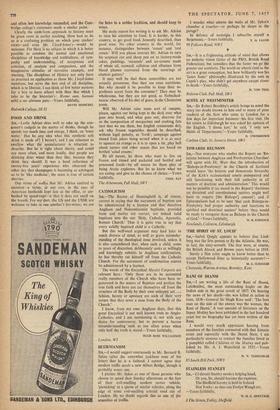FOOD AND DRINK
SIR,—Leslie Adrian does well to take up the con- sumer's cudgels in the matter of drinks, though he spends too much time and energy, I think, on 'tonic water.' Has he any idea what this synthetic soft drink is made of? I haven't, and I am reluctant to swallow what the manufacturer is reluctant to describe. But he is right about sherry, and could say more often, and more loudly, that people are drinking drier wines than they like, because they think they should. It was a head cellarman of twenty-five years'.- experience who observed the other day that champagne is becoming so astringent as to be 'like medicine';, the same is true of certain sherries.
One virtue of vodka that Mr. Adrian omitted to mention—a virtue, ai any rate, in the eyes of American husbands kept late at the office, or am- bushed by speed-cops—is that it does not smell on the breath. For my part, the US and the USSR are welcome to take in one another's fire-water; we are the heirs to a nobler tradition, and should keep to wines.
My main reason for writing is to ask Mr. Adrian to turn his attention to food. It is harder, in this country, to get good food, honestly described, than good wine. No other country in the world, for instance, distinguishes between 'cream' and 'real cream.' Will you please instruct Mr. Adrian to turn his sceptical eye and sharp pen on to factory-made cakes, puddings, 'caramels' and ice-creams made of whale oil, seaweed, cellulose and albumen from blood plasma recovered from the scourings of abattoir gutters?
It may well be that these comestibles are not actually poisonous; that they are even nutritious. But why should it be possible to keep their in- gredients secret from the consumer? They may be wholesome, but they are not good, as Nebuchad- nezzar observed of his diet of grass, in.the Chesterton poem.
Will Mr. Adrian raise some sort of rumpus, please, against our being kept in the dark over what goes into bread, and what goes out; discover for us the composition of margarines and cooking fats (not that we use them, but English restaurants do); ask why frozen vegetables should be described, without legal penalty, as 'fresh'; campaign against tinned fruit juices being served when it is as easy to squeeze an orange as it is to open a tin; play hell about !adore and other sauces that are based on bottled 'salad creams.'
By all means, let those who want to live on frozen and tinned and packeted and bottled and processed foods—by all means let them play at being Arctic explorers. But let us know what we are eating, and give us the chance of choice.—Yours


































 Previous page
Previous page